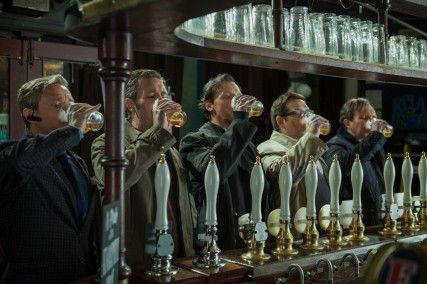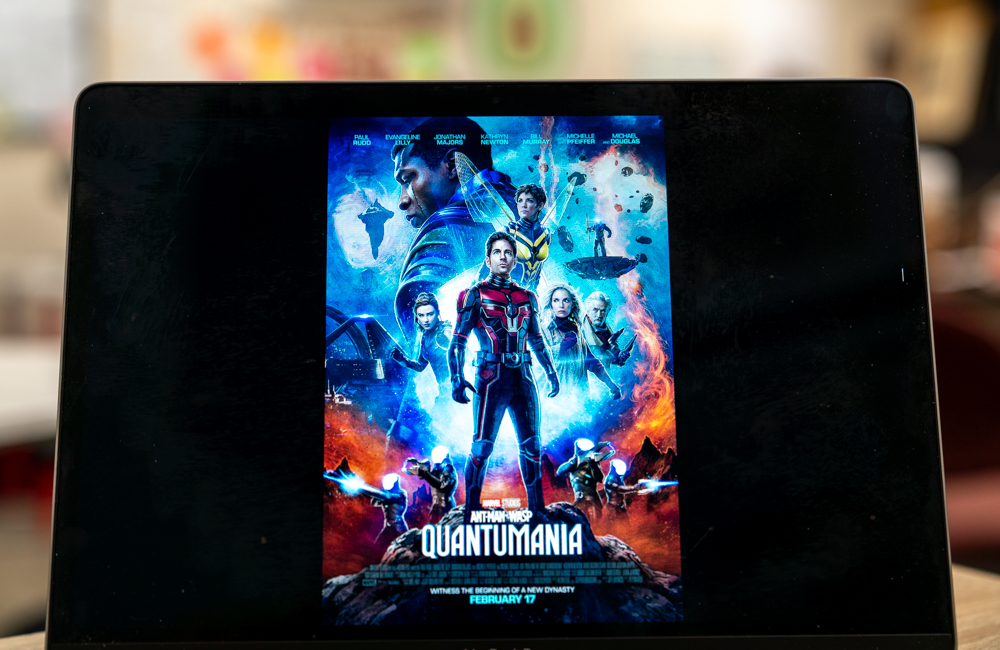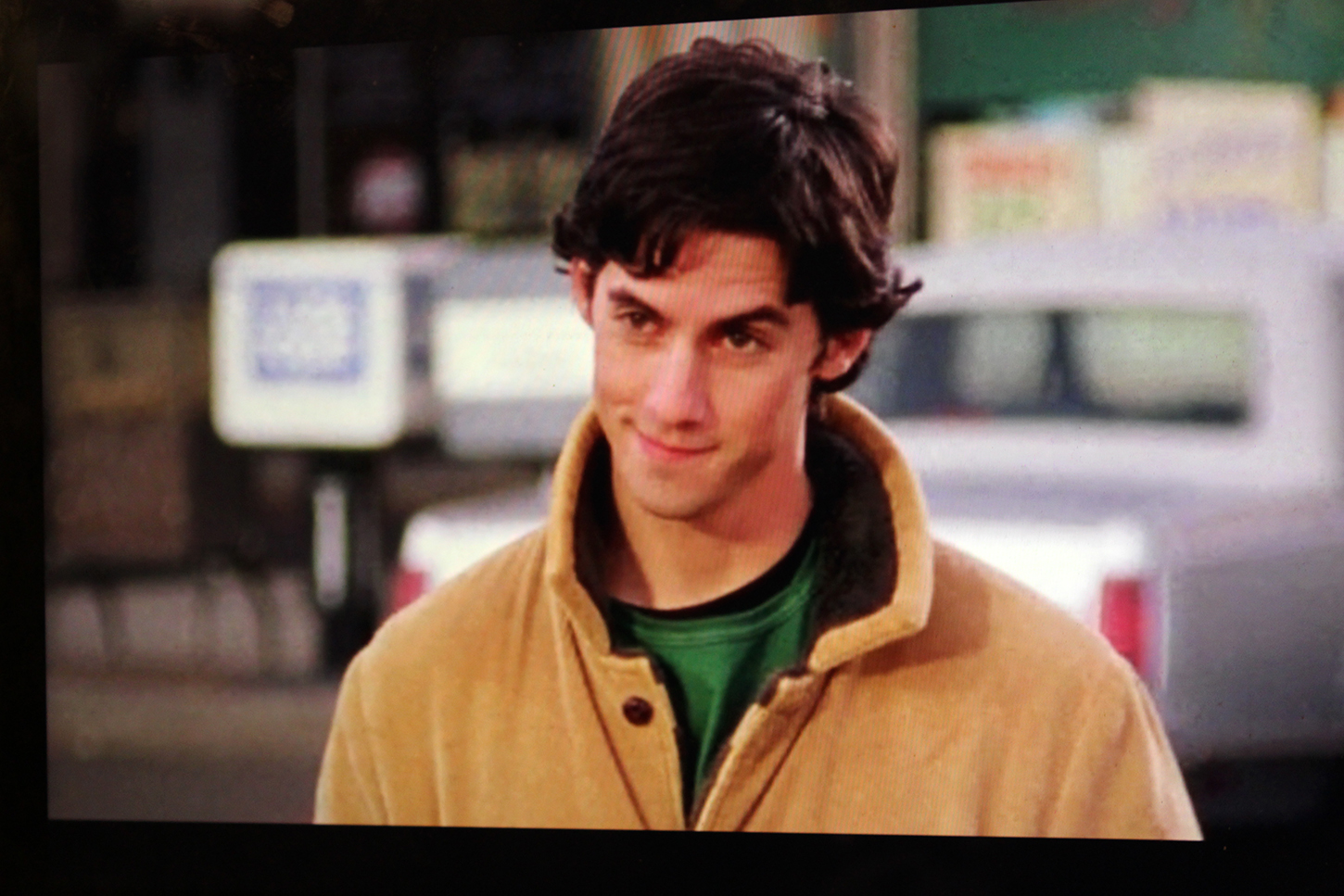Actors Simon Pegg and Nick Frost have again teamed up with director Edgar Wright for The World’s End, the concluding film in the Three Flavours Cornetto Trilogy — consisting of dark comedy masterpieces Shaun of The Dead (2004) and Hot Fuzz (2007).

In The World’s End, Gary King (Pegg) is a washed-up man-child trying to relive his glory days. As a teen, Gary and his friends attempted their hometown’s “Golden Mile,” a pub-crawl consisting of the town’s 12 pubs. Though they never reached the end, it remains the most fun and meaningful day in Gary’s life. Now, in 2013, Gary reunites his old pals (played by Frost, Martin Freeman, Paddy Considine, and Eddie Marsan) to try the “Golden Mile” once more. That – and ward off aliens.
Full disclosure: Shaun of The Dead and Hot Fuzz are my absolute favorite films so interviewing Simon Pegg, Nick Frost, and Edgar Wright was a dream come true. As an aspiring filmmaker I admire that the three are good friends, who also collaborate to make some of the smartest, best written, and funniest films out there. The three films are critically acclaimed and fanatically adored, but still stand true to the filmmakers’ artistic vision. Wright, Pegg, and Frost give hope to the idea that I can continue to make films with my best friends and one day actually pay the bills by doing so.
This is the umpteenth day of their multicity US press tour and the three are tired and huddle around their coffees – yet they give us their full attention. While answering our questions, they frequently entertain themselves with playful banter that kept the room laughing.
It is more than simply being friends that enables Pegg, Frost, and Wright to work well together. “As well as being mates, we also share a work ethic and that is to work hard,” says Frost. He reminds us that filmmaking takes long hours and full commitment — if one of the three didn’t share the same ethic, “it wouldn’t work.” Pegg calls it an “unspoken contract.”
Says Frost, “I might not literally talk to Edgar for three days on set because he’s working and you can’t take that personally. So when you walk off and say, ‘I’ll see you later’ and he doesn’t wave or come and hug you or say goodbye, you can’t get moody about that because that’s just how it is.” Wright says, “If you have somebody who’s flakey or a diva, then you’re completely screwed.” “There’s no room for that,” adds Pegg.
In the last go-round, Hot Fuzz, Pegg found it dull to play super cop Sgt. Nicholas Angel and would often crack jokes between takes to release tension. For The World’s End, says Pegg, “I wanted to do a character who was the opposite of Nicholas Angel and be very comically dynamic and very proactive.” Pegg explains, “whereas before my characters were very reactive that meant that Nick’s character, in this instance, …is very reactive to Gary and it felt like a fun thing for us to do…to change it up a bit.” Frost says that he embraced the role reversal because he didn’t want audiences to get bored of the same dynamic film after film. “That’s part of the joy of being an actor, you get to be a lot of different people,” says Frost.
In The World’s End, Gary King is shocked to see that many of the pubs he so fondly remembered now look identical. Wright talks about how pubs and cafes in the UK are getting wiped out by chains —pubs become clones of themselves with the same décor, same menus, same fake handwritten signs, and more. Walk into any Taylor Walker pub in England and you’ll see exactly this. On an aesthetic level, it creeps Wright out.
Wright says, “In the same way that Walmart think of themselves as improving the country,” the aliens in The World’s End are homogenizing forces that believe they are bettering the Earth. The three filmmakers don’t say whether homogenization is good or bad and want to leave it up to the audience. Jokes Pegg, “Who’s to say that coffee shop that used to be where Starbucks was, was actually that good? It was probably s—t, you know?”
Wright and Pegg have written the three Cornetto films collaboratively and fill the scripts with nuanced detail, delightful foreshadowing, both subtle and outrageous humor, and hint of social commentary.
With Shaun of The Dead, Pegg says they felt their way around with many screenwriting books — he and Wright applied various scriptwriting models to their favorite movies and often found that they held up quite well. When Pegg and Frost wrote 2011’s Paul, they worked from the same model with which Pegg had found success. Pegg jokes, “Nick and I were slightly more inclined to go to the cinema. If we wrote a good joke in the morning, we’d take the day off.” On Paul, Frost took over and wrote a massive 230-page draft when Pegg was busy with another film. “It has tornados in it…it was Twister,” jokes Frost.
Pegg stresses the importance of writing in the same room and bouncing ideas off each other. Even though Pegg and Wright write the films, they rely on Frost to give his opinion and provide ideas for each script. Says Frost, “It’s up to them, if they want to take them on board, then they do, if they don’t, they don’t. I don’t get moody about it, that’s just how it is.”
“You have to write,” reminds Frost. He compares writing to opening up a shop; if you don’t open up the shop in the morning, nothing will happen. Wright agrees, quoting Mike White, “If you haven’t written anything by 10:30am, you’re screwed.” For the three, it’s paramount to get into the office early and commit.
Pegg reminds Frost and Wright that the two tried to write a version of The World’s End years ago. Frost says, “we did no work” and Pegg jokes, “I’m obviously the key member of the group.”
Speaking on the trilogy, Pegg says that they couldn’t have made the films in any other order: they didn’t have the life or film experience necessary to make The World’s End first. Simon says the three films reflect “specific points in our personal growth”— little “time capsule of our lives at the time.”
Says Pegg, “When we had the idea in 2006 [for The World’s End], I’m glad we didn’t try and write it then because it took us turning 40 to really get an idea of what we wanted the film to be about.” Wright jokingly calls it a “mid-life galactic crisis film.”
“There are lots of things in this movie that come straight from our own experiences.” Wright points to a scene where Pegg has to remind Considine of an old joke. Says Wright, “I’ve had exactly that where somebody has said…a punch line to something and then has had to explain this joke that we had in 1992 in college.”
The World’s End also features fantastic performances from a superbly talented supporting cast of Freeman, Considine, and Marsan. Wright and Pegg wrote the script with the actors in mind — the first draft of the script literally used the actors’ real names.
Wright joked that Freeman (a veteran of all three Cornetto films) was “maybe…up to the task” after playing the lead in the “billion-dollar grossing The Hobbit.” Meanwhile, Considine and Marsan had done a run of dark and intense dramas. Wright says that both are enormously funny and he wanted to write them a different role that they’d want to play. To see Considine as the “sappy puppy dog” was a riot for the three. Author Daniel Waters even joked to Wright, “my favorite special effect was Eddie Marsan’s smile.
The World’s End opens nationwide today.



























































































































E. Bonnicks • Aug 23, 2013 at 10:59 pm
Great read!